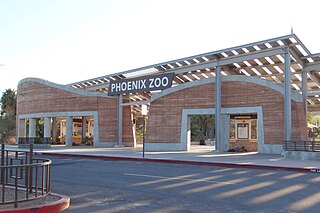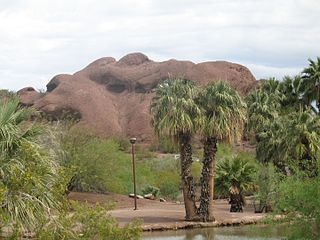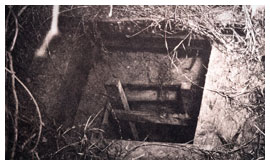
Saint Louis Cemetery is the name of three Catholic cemeteries in New Orleans, Louisiana. Most of the graves are above-ground vaults constructed in the 18th and 19th centuries.

George Wylie Paul Hunt was an American politician and businessman. He was the first governor of Arizona, serving a total of seven terms, along with President of the convention that wrote Arizona's constitution. In addition, Hunt served in both houses of the Arizona Territorial Legislature and was posted as U.S. Minister to Siam by Woodrow Wilson.

Desert Botanical Garden is a 140-acre (57 ha) botanical garden located in Papago Park, at 1201 N. Galvin Parkway in Phoenix, central Arizona.

The Phoenix Zoo opened in 1962 and is the largest privately owned, non-profit zoo in the United States. Located in Phoenix, Arizona, the zoo was founded by Robert Maytag, a member of the Maytag family, and operates on 125 acres (51 ha) of land in the Papago Park area of Phoenix. It has been designated as a Phoenix Point of Pride.

Papago Park is a municipal park of the cities of Phoenix and Tempe, Arizona, United States. It has been designated as a Phoenix Point of Pride. It includes Hunt's Tomb, which is listed on the National Register of Historic Places.

Hole-in-the-Rock is a natural geological formation in Papago Park, a municipal park of Phoenix and Tempe, Arizona.

Pueblo Grande Ruin and Irrigation Sites are pre-Columbian archaeological sites and ruins, located in Phoenix, Arizona. They include a prehistoric platform mound and irrigation canals. The City of Phoenix manages these resources as the S’edav Va’aki Museum.

The Great Papago Escape was the largest Axis prisoner-of-war escape to occur from an American facility during World War II. On the night of December 23, 1944, twenty-five Germans tunneled out of Camp Papago Park, near Phoenix, Arizona, and fled into the surrounding desert.

The Pioneer and Military Memorial Park is the official name given to seven historic cemeteries in Phoenix, Arizona. The cemeteries were founded in 1884 in what was known as "Block 32". On February 1, 2007, "Block 32" was renamed Pioneer and Military Memorial Park. The Pioneer and Military Memorial Park is listed in the National Register of Historic Places. The historic Smurthwaite House, which is also listed in the National Register of Historic Places, is located on the grounds of the Pioneer and Military Memorial Park and is used as the cemetery's main office. Pioneer and Military Memorial Park is the final resting place of various notable pioneers of Arizona.

The Double Butte Cemetery is the official name given to a historic cemetery in Tempe, Arizona. The cemetery was founded in 1888 on the baseline of the Double Butte Mountain for which it is named. It is the final resting place of various notable pioneers of the City of Tempe. The cemetery, which is located at 2505 W. Broadway Rd., is listed in the Tempe Historic Property Register Designation #46. The pioneer section of the cemetery was listed in the National Register of Historic Places on July 30, 2013, reference #13000020.

Greenwood Memory Lawn Mortuary & Cemetery is the official name given to a cemetery located at 2300 West Van Buren Street in Phoenix, Arizona owned by Dignity Memorial. The cemetery, which resulted as a merger of two historical cemeteries, Greenwood Memorial Park and Memory Lawn Memorial Park, is the final resting place of various notable former residents of Arizona. Pioneers, governors, congressman, government officials, journalists, race car drivers, soldiers, actors and actresses are among the many notable decedents who are interred in the cemetery.

The Hi Jolly Monument is a grave site in the Hi Jolly Cemetery located at Quartzsite, Arizona, United States, marking the grave of Hi Jolly, a Syrian-born camel driver brought to the United States in 1856 to drive camels for the US Cavalry. The site is located halfway between Phoenix, Arizona, and Los Angeles, California. It was added to the National Register of Historic Places in 2011.














